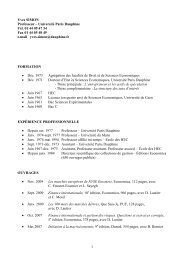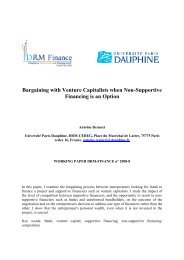Real Estate Brokers: Do they inflate housing prices? - CEREG
Real Estate Brokers: Do they inflate housing prices? - CEREG
Real Estate Brokers: Do they inflate housing prices? - CEREG
Create successful ePaper yourself
Turn your PDF publications into a flip-book with our unique Google optimized e-Paper software.
esults have risen from empirical studies on this important topic. Some conclude that realestate brokers do influence the selling <strong>prices</strong> of homes, others refute such effect. Moreover,results also differ across house price ranges. The lack of consensus in the literature mayreflect the fact that the data used was too local and sample sizes relatively small. In addition,early empirical results were not systematically corrected for selection bias in the samples.Indeed, Jud, Elder, Zumpano and Baryla, among others, have shown that buyers who buythrough a broker have different characteristics and different <strong>housing</strong> consumption level thanthose who search by themselves.Jud (1983) estimated the demand for real estate brokerage services by both sellers and buyersusing a conditional Logit model. The results obtained from 529 <strong>housing</strong> transaction data in1979 from three urban areas in North Carolina indicated that home sellers’ decision to engagea real estate broker mainly depends on <strong>housing</strong> market transaction costs including the cost ofseller’s time. For home buyers, Jud found that the decision to use a broker during <strong>housing</strong>search was determined by the buyer’s prior knowledge of the <strong>housing</strong> market and theopportunity cost of the buyer’s time. Jud measured the buyer’s information level on the<strong>housing</strong> market by identifying whether or not the buyer was a local resident, familiar with themarket and whether or not the buyer was an experienced previous owner. It appeared thathigher income buyers were more likely to employ a broker. Buyers who seek the assistance ofbrokers conducted more rapid searches and spend substantially more on <strong>housing</strong>. Jud foundthat brokers do not influence the <strong>prices</strong> of the houses <strong>they</strong> sell, although <strong>they</strong> do increase thelevel of <strong>housing</strong> consumption of buyers.In a subsequent paper, Jud and Frew (1986), using different data (one single area in NorthCarolina) and methods, found that broker-assisted home sellers obtain higher <strong>prices</strong> for theirhomes. They confirmed the previous conclusion that broker-assisted home buyers have higherdemands for <strong>housing</strong> than buyers who do not employ real estate agents. They suggested thatbroker intermediation generates sales effect similar to that of advertising. Indeed, brokers playa screening role for sellers by matching up potential buyers whose demand for <strong>housing</strong>corresponds to the houses of the sellers <strong>they</strong> represent.Black and Nourse (1995) examined the effect of two brokerage modes on both price andclosing cost allocations between buyers and sellers based on only 80 single-family residentialsales between early 1989 to mid-1990 in north suburban Atlanta, Georgia. The first model, the4



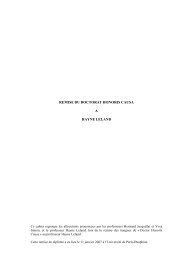
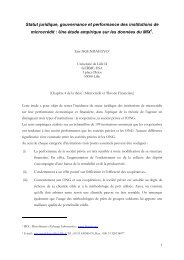
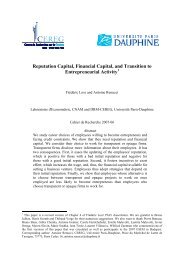
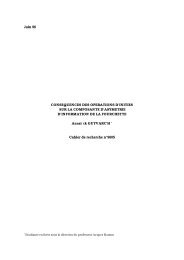
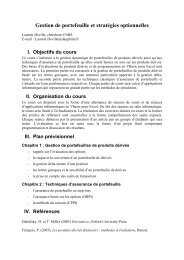
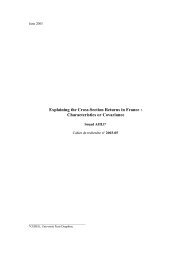
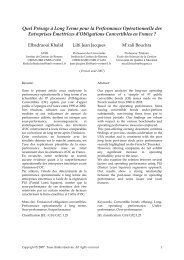
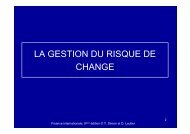
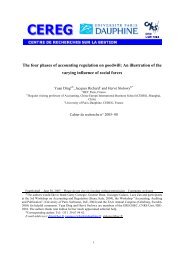
![& 6 ] ^ F ]^ - CEREG - Université Paris-Dauphine](https://img.yumpu.com/33326502/1/184x260/-6-f-cereg-universitac-paris-dauphine.jpg?quality=85)

